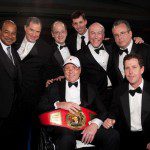Joseph Robert: A Victorious Life
By • May 3, 2012 0 2995
By John Fenzel
On Wednesday, Dec. 7, Joseph E. Robert Jr., one of the Washington area’s great philanthropists, passed away after a battle with Glioblastoma, a form of brain cancer that also afflicted Senator Edward Kennedy. News of Robert’s death quickly spread throughout Washington’s circles in quiet, almost reverential tones among the many who knew him.
At Cafe Milano, Steve Delonga pointed at the table against the wall where Robert frequently dined. “Joe was a fighter, a businessman, and friend who left an enduring legacy. He was always busy, always grateful, and always surrounded by people. But across the room, he would see you, smile, and give you a ‘thumbs-up’ sign.”
Robert grew up in a Catholic, middle class family in Silver Spring, Md. And yet in 1970, his penchant for fistfights and ill-advised pranks at St. John’s College High School nearly caused him to drop out altogether. An accomplished athlete, Robert won a regional kickboxing championship in 1973. That same year, while attending Mount Saint Mary’s College, he came forcefully to the aid of a dog being abused, and was promptly expelled for fighting. “While college didn’t exactly work out for Joe,” a high school friend recalled, “the dog he saved stayed with him. That was pretty typical—Joe didn’t stop at ‘rescue.’”
“He always focused on the end game and didn’t get distracted by the tactics involved in getting there,” Michela English, the president and CEO of Robert’s foundation, Fight For Children, said. “He was even more passionate about his charitable causes than business.”
In 1981, Robert began canvassing banks to loan him money to purchase distressed real estate. Most turned him away.
“It was a hard sell, because it was the beginning of the S&L Crisis,” Yankel Ginzburg said. “When conventional wisdom was to stay out of the market, Joe had a different idea.”
Robert ultimately convinced Riggs Bank to agree to the loan.
His first condominiums were in the Beltsville, Md. area. “Joe would come by in person to pick up the rent checks,” Pamela Ginzburg, one of his first tenants, remembered. “He was involved in all aspects of his business. He had an unrivaled work ethic, and he never forgot his first tenants.”
In 1989, when the S&L crisis was at a critical stage, Congress appropriated billions to create the Resolution Trust Corporation. Recognizing an opportunity, Robert formed a parallel association to ensure a role for the private sector.
Several years later, Robert had begun a private equity real estate fund business that ultimately became known as JER Partners, managing assets around the world worth nearly $30 billion.
In 1990, channeling his love for boxing and his desire to help children, Robert started “Fight Night” to help disadvantaged youth. Leveraging his close personal friendships with Quincy Jones, Lionel Richie, Billy Dee Williams and others, Robert grew his Fight Night and the annual charity event came to attract world renowned boxers to the Washington Hilton Hotel and Towers. Boxing legends like Sugar Ray Leonard, Gerry Cooney, Roberto Duran and Joe Frazier could often be seen ringside with Robert—along with city mayors, Joint Chiefs of Staff, business leaders, and Hollywood celebrities.
The Fight Night event was a formal “men-only” event. Later, Robert began a separate “sister” women-only venue to fight domestic violence called “Knock Out Abuse” at the Ritz-Carlton in Washington. A tradition soon developed for the “Fight Night” men and the “Knock Out Abuse” ladies to convene immediately after the festivities.
“Fight Night” continues to be the premier event for Robert’s signature cause, “Fight For Children,” a foundation he established to improve education and health care opportunities for low income children in Washington, D.C. Since he founded the organization, Fight For Children has directly raised $100 million.
“He didn’t just write checks. He got personally involved so he could really make a difference,” English, said. “No matter how hard we have all tried to prepare for his passing, it is still very difficult to believe that he is no longer with us. It’s not an overstatement to say that tens of thousands of kids in D.C. are better off because of Joe.”
For those who knew him well, Joe Robert’s authenticity was a defining trait. As the chairman of Business Executives for National Security, he once left a White House luncheon for a visiting Chinese president early, so he could read to his son’s kindergarten class. “He had a great sense of humor and never took himself or anyone else too seriously,” English said.
Joe Robert will always be a hero to his family, his friends and to the children who benefited from his generous leadership and positive vision. In his final hours, Robert reportedly could not speak to those who came to see him at his home. “So he smiled and gave everyone a ‘thumbs up’ sign instead,” a close friend said.
John Fenzel is an Army Special Forces Officer stationed in Washington, D.C.





